MessengerTime (Easy Removal Guide) - Free Instructions
MessengerTime Removal Guide
What is MessengerTime?
MessengerTime – an app that imitates Facebook Messenger to deliver tons of unwanted ads
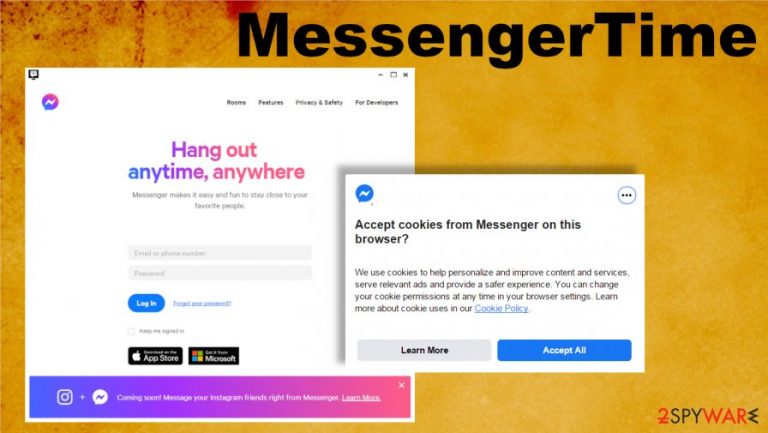
MessengerTime is a potentially unwanted program (PUP) that has nothing to do with the Messenger of the social media giant Facebook. It mimics legitimate messenger's logos and other appearances and is advertised to enable messaging directly from any personal computer's desktop. Developers made sure that the PUP resembles the original messaging app as much as possible, so people might fall for the promotional ad online and download the useless program.
The imitation is done to trick users into downloading and installing MessengerTime virus. As soon as that's done, users will start to see more and more ads when they're browsing the internet. Excessive ads (sometimes even covering most of the screen) originate from other sources than the websites that are being visited. The PUP is related to third-parties and other suspicious companies, so make sure to get rid of the app as soon as possible.
| name | MessengerTime |
|---|---|
| type | Adware, potentially unwanted program |
| Symptoms | Slower device performance, slower browsing speed, excessive ads |
| Risks | Privacy issues, installation of other PUPs |
| Distribution | Software/freeware vendors, deceptive ads |
| Detection names | PUA:Win32/Presenoker, PUP.Optional.MessengerTime, Trojan.Win32.Softninjas.ghppke, Win32:Malware-gen, Artemis!B990B9962AEF[1] |
| Removal | Adware, like all PUPs, should be removed with the help of professional anti-malware software |
| Repair | Restore corrupted or damaged files of the devices with powerful system repair tools like the FortectIntego app |
Because of that, this PUP can be called MessengerTime adware and might pose a threat to its users. The displayed ads might be promoting online casinos, adult, and other questionable sites, which may lead to the installation of other PUPs or privacy issues.
It can be downloaded from an abundance of online software vendors. We advise our readers against installing this adware. If you already have it on your device, then we're glad you picked us as your cybersecurity experts. This article contains a detailed summary and free removal instructions.
There's a bunch of adware, like Spy Alert virus, iVIDI virus, GenieGamer virus, and other potentially unwanted programs that could infect devices and ruin browsing experiences by showing a massive amount of various commercial content. MessengerTime ads may redirect to adult, gambling, and other high-risk websites.
Moreover, the adware can track and record users' browsing habits and related information, such as most visited sites, search inquiries, device info, and so on. Collected information might be shared with advertisers who could tailor deceptive ads to each user, so more of them get clicked.
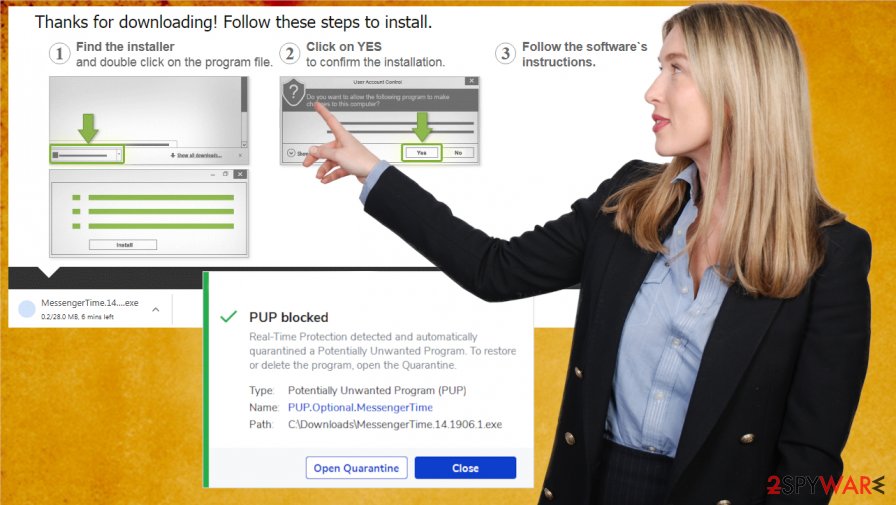
That's why we highly recommend everyone to remove MessengerTime from their devices as soon as possible. You can do that by performing a full system scan with trustworthy anti-malware tools like SpyHunter 5Combo Cleaner or Malwarebytes that will automatically take care of this PUP.
All installed programs leave some traces and usually insert themselves into the system registry and other key files/settings. Thus IT experts[2] recommend using the FortectIntego system repair tool right after MessengerTime removal. This powerful app will restore all system values to normal and prevent abnormal system behavior.
Taking precautionary measures to avoid infections
Malware has been active for decades,[3] and it's getting only more severe. There are many kinds of computer infections that could impede normal device performance or incapacitate the device altogether. Although tech giants like Google, Apple, Microsoft, and others are doing their best to make the internet a safer place, it's tough to keep up with cybercriminals.
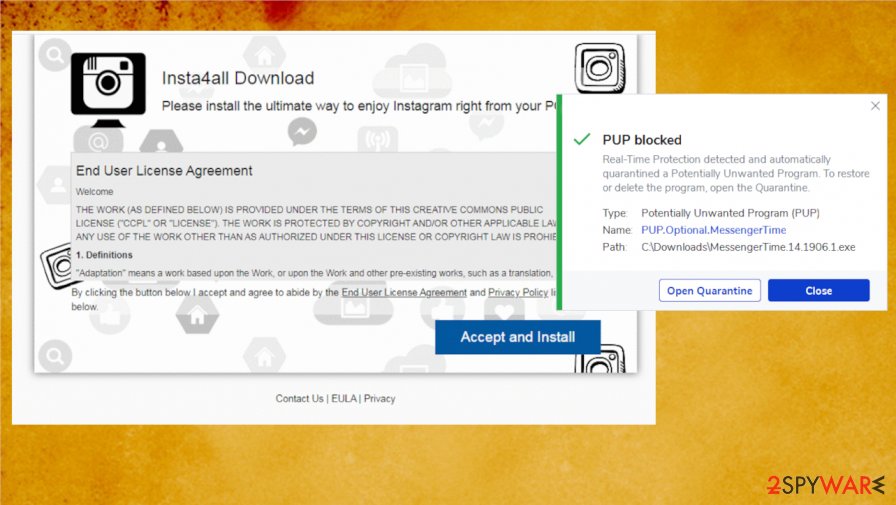
That's why our cybersecurity research team has produced guidelines for home users that would enhance their cybersecurity level. Keep in mind that by implementing these suggestions, you won't be 100% safe, but they won't do any harm for sure:
- Install a professional anti-malware software that would prevent PUPs and malware from getting access to your device.
- Update your operating system and installed software with the latest versions.
- Store backups in at least two separate locations/devices. One of which should be offline storage.
- Keep your system files and settings at bay with system repair tools.
- Learn about the most popular malware distribution techniques, such as spam emails, deceptive ads, file-sharing platforms, and alike.
Remove MessengerTime virus and restore system settings
MessengerTime is an imitation of Facebook Messenger and will bombard its users with loads of ads, which might redirect to hazardous websites. This adware poses more than a few threats, including privacy issues, installation of additional PUPs, and so on.
Every user that got deceived into installing this software should get rid of it, and the sooner, the better. We are advising using anti-malware tools to remove MessengerTime, as only by using such tools like SpyHunter 5Combo Cleaner or Malwarebytes, users can be assured there are no files left behind that would impede system performance.
And don't forget to restore overall system health after MessengerTime removal is completed. If you registered a new account with the same credentials as Facebook Messenger, change the passwords immediately because it's better to be safe than sorry. Run FortectIntego for any system issues that can be fixed with file repair.
Getting rid of MessengerTime. Follow these steps
Uninstall from Android
Uninstall unwanted programs from Android device:
- Go to Settings -> Apps/Applications.
- Expand the full list of the installed apps.
- Scroll through the list and tap on a suspicious application once.
- Tap on it and select Uninstall.
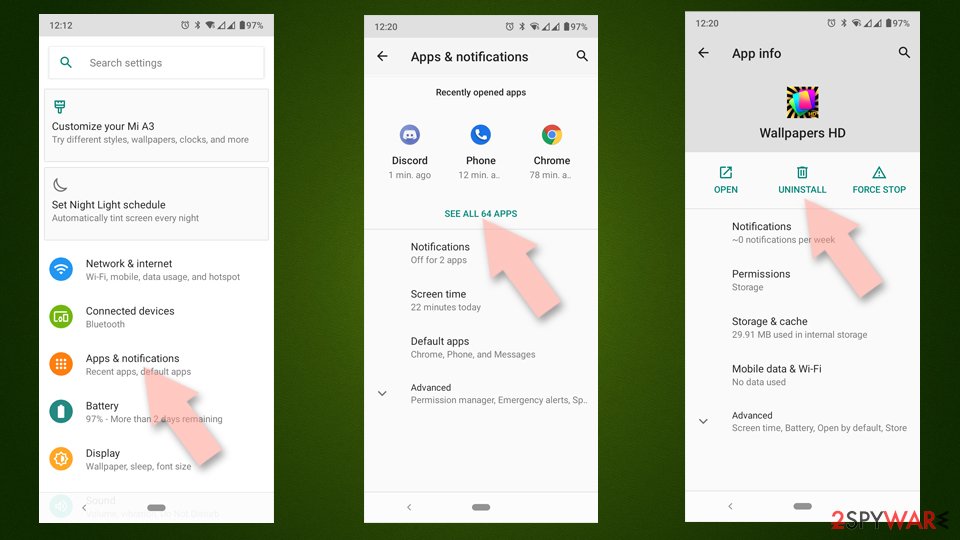
- Reboot the device.
Clear Storage and data files on Android from Google Chrome or other apps:
- Go to Settings > Apps/Applications.
- Expand the full list of the installed apps.
- Tap on Chrome and select Storage & cache.
- Clear storage and clear cache of the app.
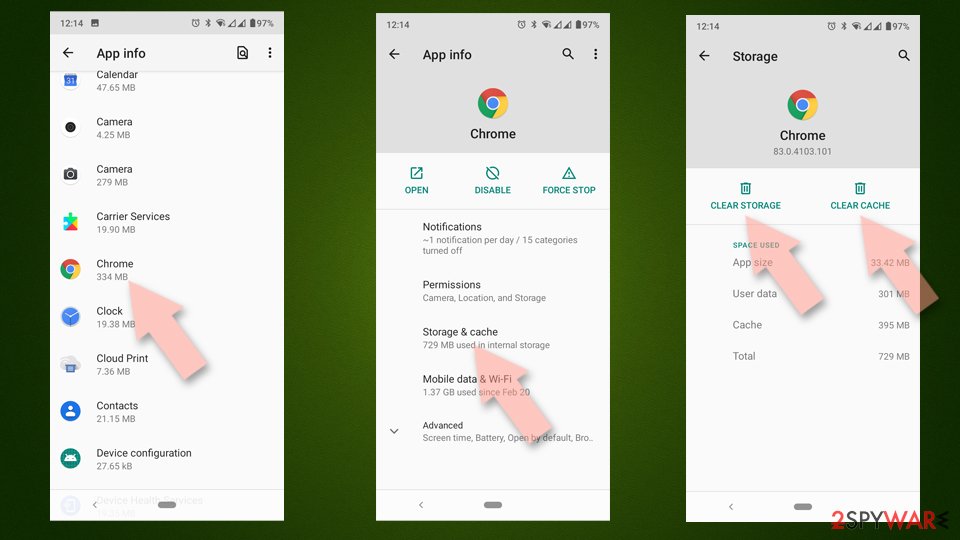
If you are seeing ads on top of other apps but are not sure what is causing it, perform the following steps:
- Go to Apps/Applications.
- Tap Advanced.
- Select Special App access.
- Tap on Display over other apps.
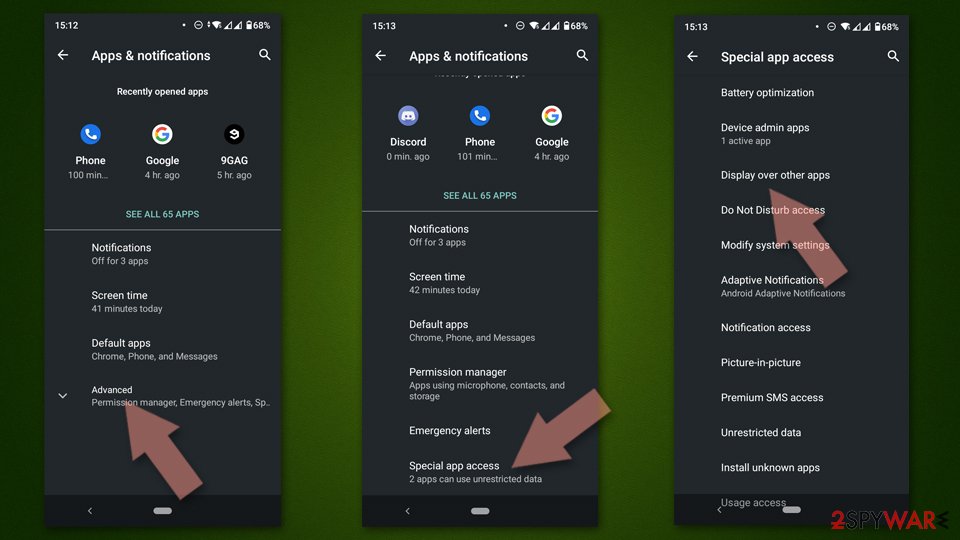
- Eliminate apps with these access rights enabled.
Uninstall from Windows
Instructions for Windows 10/8 machines:
- Enter Control Panel into Windows search box and hit Enter or click on the search result.
- Under Programs, select Uninstall a program.

- From the list, find the entry of the suspicious program.
- Right-click on the application and select Uninstall.
- If User Account Control shows up, click Yes.
- Wait till uninstallation process is complete and click OK.

If you are Windows 7/XP user, proceed with the following instructions:
- Click on Windows Start > Control Panel located on the right pane (if you are Windows XP user, click on Add/Remove Programs).
- In Control Panel, select Programs > Uninstall a program.

- Pick the unwanted application by clicking on it once.
- At the top, click Uninstall/Change.
- In the confirmation prompt, pick Yes.
- Click OK once the removal process is finished.
Delete from macOS
Remove items from Applications folder:
- From the menu bar, select Go > Applications.
- In the Applications folder, look for all related entries.
- Click on the app and drag it to Trash (or right-click and pick Move to Trash)

To fully remove an unwanted app, you need to access Application Support, LaunchAgents, and LaunchDaemons folders and delete relevant files:
- Select Go > Go to Folder.
- Enter /Library/Application Support and click Go or press Enter.
- In the Application Support folder, look for any dubious entries and then delete them.
- Now enter /Library/LaunchAgents and /Library/LaunchDaemons folders the same way and terminate all the related .plist files.

Remove from Microsoft Edge
Delete unwanted extensions from MS Edge:
- Select Menu (three horizontal dots at the top-right of the browser window) and pick Extensions.
- From the list, pick the extension and click on the Gear icon.
- Click on Uninstall at the bottom.

Clear cookies and other browser data:
- Click on the Menu (three horizontal dots at the top-right of the browser window) and select Privacy & security.
- Under Clear browsing data, pick Choose what to clear.
- Select everything (apart from passwords, although you might want to include Media licenses as well, if applicable) and click on Clear.

Restore new tab and homepage settings:
- Click the menu icon and choose Settings.
- Then find On startup section.
- Click Disable if you found any suspicious domain.
Reset MS Edge if the above steps did not work:
- Press on Ctrl + Shift + Esc to open Task Manager.
- Click on More details arrow at the bottom of the window.
- Select Details tab.
- Now scroll down and locate every entry with Microsoft Edge name in it. Right-click on each of them and select End Task to stop MS Edge from running.

If this solution failed to help you, you need to use an advanced Edge reset method. Note that you need to backup your data before proceeding.
- Find the following folder on your computer: C:\\Users\\%username%\\AppData\\Local\\Packages\\Microsoft.MicrosoftEdge_8wekyb3d8bbwe.
- Press Ctrl + A on your keyboard to select all folders.
- Right-click on them and pick Delete

- Now right-click on the Start button and pick Windows PowerShell (Admin).
- When the new window opens, copy and paste the following command, and then press Enter:
Get-AppXPackage -AllUsers -Name Microsoft.MicrosoftEdge | Foreach {Add-AppxPackage -DisableDevelopmentMode -Register “$($_.InstallLocation)\\AppXManifest.xml” -Verbose

Instructions for Chromium-based Edge
Delete extensions from MS Edge (Chromium):
- Open Edge and click select Settings > Extensions.
- Delete unwanted extensions by clicking Remove.

Clear cache and site data:
- Click on Menu and go to Settings.
- Select Privacy, search and services.
- Under Clear browsing data, pick Choose what to clear.
- Under Time range, pick All time.
- Select Clear now.

Reset Chromium-based MS Edge:
- Click on Menu and select Settings.
- On the left side, pick Reset settings.
- Select Restore settings to their default values.
- Confirm with Reset.

Remove from Mozilla Firefox (FF)
Remove dangerous extensions:
- Open Mozilla Firefox browser and click on the Menu (three horizontal lines at the top-right of the window).
- Select Add-ons.
- In here, select unwanted plugin and click Remove.

Reset the homepage:
- Click three horizontal lines at the top right corner to open the menu.
- Choose Options.
- Under Home options, enter your preferred site that will open every time you newly open the Mozilla Firefox.
Clear cookies and site data:
- Click Menu and pick Settings.
- Go to Privacy & Security section.
- Scroll down to locate Cookies and Site Data.
- Click on Clear Data…
- Select Cookies and Site Data, as well as Cached Web Content and press Clear.

Reset Mozilla Firefox
If clearing the browser as explained above did not help, reset Mozilla Firefox:
- Open Mozilla Firefox browser and click the Menu.
- Go to Help and then choose Troubleshooting Information.

- Under Give Firefox a tune up section, click on Refresh Firefox…
- Once the pop-up shows up, confirm the action by pressing on Refresh Firefox.

Remove from Google Chrome
Delete malicious extensions from Google Chrome:
- Open Google Chrome, click on the Menu (three vertical dots at the top-right corner) and select More tools > Extensions.
- In the newly opened window, you will see all the installed extensions. Uninstall all the suspicious plugins that might be related to the unwanted program by clicking Remove.

Clear cache and web data from Chrome:
- Click on Menu and pick Settings.
- Under Privacy and security, select Clear browsing data.
- Select Browsing history, Cookies and other site data, as well as Cached images and files.
- Click Clear data.

Change your homepage:
- Click menu and choose Settings.
- Look for a suspicious site in the On startup section.
- Click on Open a specific or set of pages and click on three dots to find the Remove option.
Reset Google Chrome:
If the previous methods did not help you, reset Google Chrome to eliminate all the unwanted components:
- Click on Menu and select Settings.
- In the Settings, scroll down and click Advanced.
- Scroll down and locate Reset and clean up section.
- Now click Restore settings to their original defaults.
- Confirm with Reset settings.

Delete from Safari
Remove unwanted extensions from Safari:
- Click Safari > Preferences…
- In the new window, pick Extensions.
- Select the unwanted extension and select Uninstall.

Clear cookies and other website data from Safari:
- Click Safari > Clear History…
- From the drop-down menu under Clear, pick all history.
- Confirm with Clear History.

Reset Safari if the above-mentioned steps did not help you:
- Click Safari > Preferences…
- Go to Advanced tab.
- Tick the Show Develop menu in menu bar.
- From the menu bar, click Develop, and then select Empty Caches.

How to prevent from getting adware
Choose a proper web browser and improve your safety with a VPN tool
Online spying has got momentum in recent years and people are getting more and more interested in how to protect their privacy online. One of the basic means to add a layer of security – choose the most private and secure web browser. Although web browsers can't grant full privacy protection and security, some of them are much better at sandboxing, HTTPS upgrading, active content blocking, tracking blocking, phishing protection, and similar privacy-oriented features. However, if you want true anonymity, we suggest you employ a powerful Private Internet Access VPN – it can encrypt all the traffic that comes and goes out of your computer, preventing tracking completely.
Lost your files? Use data recovery software
While some files located on any computer are replaceable or useless, others can be extremely valuable. Family photos, work documents, school projects – these are types of files that we don't want to lose. Unfortunately, there are many ways how unexpected data loss can occur: power cuts, Blue Screen of Death errors, hardware failures, crypto-malware attack, or even accidental deletion.
To ensure that all the files remain intact, you should prepare regular data backups. You can choose cloud-based or physical copies you could restore from later in case of a disaster. If your backups were lost as well or you never bothered to prepare any, Data Recovery Pro can be your only hope to retrieve your invaluable files.
- ^ VirusTotal. Virustotal. Suspicious file analysis.
- ^ Uirusu. Uirusu. Spyware and security news.
- ^ Jon Martindale. From pranks to nuclear sabotage, this is the history of malware. Digitaltrends. Tech news, reviews, deals and hot-to's.
